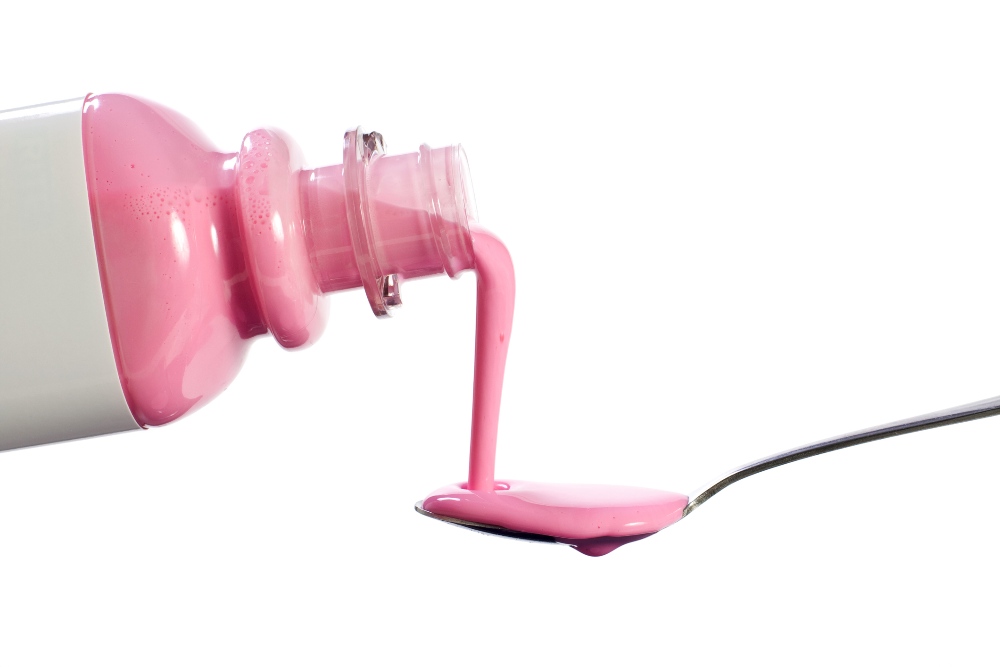Note: The following dosages are often used when treating dogs with the original 1.75% Pepto-Bismol liquid (17.5 mg of bismuth subsalicylate per milliliter). Always seek approval from your vet before use. To treat acute diarrhea, 0.5 mL/lb (1 US teaspoon for every 10 pounds your dog weighs) can be given every 4 to 6 hours for 5 days. The dosage can be higher depending on how severe the symptoms are and other contributing factors, with a maximum recommended dose of 0.9 mL/lb to be given every 6 to 8 hours. Shake the bottle well before use. A dosage of 0.5 mL/lb is shown on the chart below:
When used as a coating agent during the treatment of uremic gastritis, 0.9 mL/lb is typically given three to four times daily. When treating Helicobacter gastritis with triple therapy, the following combination is recommended: 1. Metronidazole – 7 mg/lb every 8 hours. 2. Amoxicillin – 5 mg/lb every 8 hours. 3. Pepto-Bismol – 0.1 mg/lb every 4 to 6 hours. Treatment with this protocol will last for approximately 21 days. If your dog retches at the taste, cooling it in the refrigerator helps to make it more palatable. Warning: The “Max Strength” formula contains double the amount of active ingredient per milliliter. If you are using the Max Strength formula, cut the above recommended dosages in half to avoid overdose.
It’s usually safe to use Pepto-Bismol in moderate amounts, though large doses or treatment over long periods of time can increase the risk of unwanted effects. Aside from this, it’s important that you see a vet to determine the cause of your dog’s diarrhea, as diarrhea can sometimes be a symptom of a larger problem including parasite infections, and in these cases the medicine may not be suitable. When given with aspirin, blood serum levels of salicylate could become elevated, which could lead to salicylate poisoning. The effects of salicylate poisoning are serious and can include coma, breathing difficulties, tremors, seizures and internal bleeding. In the most severe cases of poisoning, death can occur. Pregnancy/Nursing: It is recommended that owners avoid giving the medicine to pregnant or nursing pets.
Keep an eye on the color of your dog’s stools during treatment. Stools may become tinted green or gray during treatment, which is a common effect of the drug, but if it becomes tar-like (a sign of bleeding) you should contact the vet immediately. Unless directed by a vet, avoid use alongside aspirin due to the risk of toxicity and avoid use with any other medication with blood-thinning properties (e.g. warfarin). Careful monitoring is recommended in cases where internal bleeding is likely or when other salicylate drugs are being used at the same time. In terms of drug interactions, the medicine can interfere with the absorption of other medicines including tetracycline (if given orally).
While gray or green tinted stools are common, tarry black stools indicates internal bleeding and warrant a call to the vet right away. Overdose Overdoses can be dangerous due to the salicylate component of the medicine. If you suspect an overdose seek emergency veterinary attention or call the ASPCA poison control hotline on (888) 426-4435. Sources Dr. J. Bartges Plumb’s Veterinary Drug Handbook (sixth edition)
How to Treat Dog Tummy Problems
An upset stomach can be caused by a number of things, such as stress or anxiety, switching to a new food, medication side effects, or consuming something they shouldn’t have. For dog tummy troubles, Pepto Bismol should not be the first attempt for treatment. Vet-recommended methods for treating mild stomach upset include:
Severe or prolonged conditions need to be treated by a vet, however, so don’t administer any OTC medications until you’ve consulted your pup’s doctor. Knowing what your pet has gotten into can help tremendously when visiting the vet, as diarrhea can come from a myriad of sources. Remember – if your dog has had diarrhea for more than a day, or is exhibiting any of the following symptoms, go to the vet:

NOTE: If your dog still has diarrhea after a few doses, stop the medication and call your veterinarian.
Pepto is not a flavor beloved by dogs, so dosing them requires some tricks. Use an empty (no needle) plastic syringe to give your dog the medication. Holding your dog’s head in its normal position, gently pull your dog’s upper lip back to expose the upper teeth. Place the syringe just behind the upper canine tooth, then position the syringe so that it is just inside the mouth and angled toward your dog’s throat. Slowly push the plunger, then gently hold his muzzle closed for a second to ensure he swallows it.
AKC’s Chief Veterinary Officer Dr. Jerry Klein says he rarely mentions Pepto to patients because the formula’s salicylates could cause gastric bleeding, and the bismuth in the medication can turn the stool black, which in turn may mask any gastric bleeding: “If it must be given, offer no more than one or two doses after consulting with your veterinarian.”
The following dogs should not take Pepto:
A safer choice is a bismuth subsalicylate product formulated especially for dogs called Corrective Suspension, which is only available via your vet.
Clubs Offering:
Dogs, like people, can be afflicted with stomach problems, including indigestion, diarrhea, and gas. Although severe or prolonged symptoms should always be treated by a veterinarian, minor cases of stomach upset or diarrhea can be cared for at home with “people” medications that are safe for dogs. If symptoms persist or if you’ve never given a food or medication mentioned below to your dog, call your veterinarian.
Side Effects
Side effects are rare and usually mild. The most common side effects are constipation, oddly colored stools (grey, black, or green), or a darkened tongue. If your dog exhibits shortness of breath or starts acting “off,” get to an emergency vet clinic immediately and let them know any prescription drugs he’s on, including the Pepto. They can check for gastric bleeding or other rare complications.